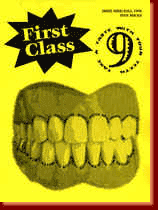


WHITE DEATH
by Alan Catlin
MOONSHINE AND CAUSTIC SODA
he called and by way
of explanation claimed it
was something the boys
back home down South had
been drinking for generations
which I presumed the way his
family got together, intermarried
and had children meant a home
brew they'd been making since
The Korean War to entertain
the troops not fighting overseas.
The caustic soda was to throw off
The Revenuers -- rhymes with sewers
to you Northern boys -- he sd --
& for cleaning out them old drain
pipes -- I knew better than to ask
which drain pipes he meant.
COLLISION COURSE
by Michael Newell
I.
When they pass, it's a collision
of future and past (but which is which):
one covered crown to toe, wearing
a horsehide-veil and long skirt over pants;
one scarcely covered -- skyblue micro-miniskirt,
bare shoulders and back, auburn
hair swinging loosely across deep tan,
neckline plunging nearly as low
as the hemline rises.
One is Uzbek, one is Russian.
They don't even glance in passing.
For one hundred and fifty years, Tashkent
has been the Russian cultural center
in Central Asia. Now Uzbeks own
their land again -- Russians leave,
or stay with an uncertain future.
Most Uzbeks speak Russian. Few
Russians speak Uzbek.
A Russian is said to have told an Uzbek,
"I don't understand your anger. We brought
you culture. We civilized you."
The Uzbek replied, "You taught us
two things: how to drink, and how
to fornicate." With such different perceptions,
can there be understanding, or (at the very least)
accommodation? The two women pass without a glance.
Every month, more veils appear. Russian skirts get shorter.
II.
They grow in numbers: traffic cops
ceaselessly seeking bribes on corner after corner;
and greyskinned, ill-dressed, dull-eyed
drunks with broken blood vessels
creating patchwork quilts of misery
across stupefied faces unable,
or unwilling, to remember how
they arrived in their current threadbare rags
in a city they once controlled.
In the new REPUBLIC OF UZBEKISTAN, President
Islam (consider the implications of such
a first name for the leader of a prototypical
Soviet state) Karimov quadruples the size
of the old police force -- making the police
the largest single source of employment
other than planting and picking cotton (and,
you can be sure, the cops' supplemental income
is greater than anything available in them old cotton fields).
Consider a leader of Uzbekistan, whose every thought
was shared by the old Soviet Empire, whose best
language is Russian, whose ancestors include Tajiks,
and whose wife is Russian; consider such a man
ruling a country whose majority Uzbek population hates Russians,
has contempt for Tajiks, and are rediscovering Islam
after seventy years of Marxist Leninist rule. Consider: the streets,
run by cheap thuggish Uzbek cops; local businesses, controlled by the Mafia;
the poor -- struggling Uzbek cotton farmers, barely surviving kiosk owners,
the homeless.
III.
"We are on a collision course with history. Here,
here is where the past is revered, and will guide
us into the future. Businesses from all over
the world come to Tashkent because we are the future.
We keep one foot in the past to keep us upright
as our other foot steps into the twenty-first century.
Tradition roots us, vision guides our growth,
the resulting tree is one of beauty, of excellence. A tree
is my metaphor, because Tashkent is famous as a home for trees."
Tashkent IS a home for trees. They hide the ugly
decaying Soviet-era architecture. They ameliorate
the summer heat with green leafy canopies
which overarch many streets. They make a dull city
into a cool park. And there is tradition here --
weddings which summon enough guests to populate
a modest-sized town; casual hospitality to a stranger
as generous as that displayed by Arabs; art, pottery, music,
theatre, dance, poetry, and cuisine -- Uzbek, Russian, Tajik, Korean, and Jewish.
But business has no home here save in bazaar and kiosk. Yes,
businesses do come to Tashkent from all over the world -- to be punitively
taxed, to have their hard currency frozen and used by the government
with no accounting or repayment, to be denied currency
convertibility, to find laws changed weekly, to pay bribes
to officials who then change jobs and to be met by new officials
with their hands out. The government defaults on loans
from the IMF and expresses wonder when multinationals leave. The small farmer
toils endlessly to see his profits siphoned off by government ministers.
IV.
Some metaphors for the future: a Russian girl balancing
on high platform shoes, semi-naked in her silvery dress, meeting
her Uzbek Mafia boyfriend decked-out in muscle t-shirt
and jeans, slipping into his Mercedes, and blasting
through a red light where a policeman
has a gypsy cab owner pulled over
and pulling out documents -- none of which
pass muster -- until (at last) a shaking of hands
exchanges enough currency to let the driver move on;
an eighteen year old Russian waitress trying to sell
her body to an expatriate three times her age;
a woman in a horsehide veil working for ten dollars
a month in a sweatshop to produce cheap versions
of European clothes; an Uzbek school guard
saying that he watches CNN for the truth -- local
television tells only lies; the Russian boy who chants,
"Money Money Give Me Money," to every passing foreigner;
the Mayor who wants a million dollar bribe before letting a major
international hotel firm use city land to help upgrade
a failing hotel -- the firm agrees, but wants to pay half
up front, half on completion -- no deal says His Honor; the Mafia leader
who offers an international school three hundred thousand dollars
to help it afford new facilities -- after all, his son
attends the school and is failing; the Uzbek wedding party
which welcomes any passing stranger, who feeds and fetes him
like he was a prodigal son returned; and the Uzbek father and son,
fifth and sixth generation ceramicists, who work in styles two thousand years old.